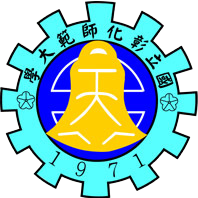SDG17.2.1 Relationships with regional NGOs and government for SDG policy
NCUE actively participates in the policies of NGOs and the government to promote sustainable development goals. The teachers directly participate or are involved in the formulation of the government’s policies on sustainable development goals by implementing government or non-government plans and serving as members of relevant departments, as follows.
- In 2021, Professor Ie-Bin Lian of Data Research Center at NCUE undertook a project to build an online learning and testing platform for SDG and SFH courses for the General Association of the Scouts of China (Taiwan). The project aimed to align with the goals of Better World Framework of Scouts for SDGs to design online training courses and certification systems for SDG and anti-drug/anti-bullying courses.
Online learning and testing platform for SDG and SFH courses for the General Association of the Scouts of China (Taiwan): http://120.107.155.233/ScoutElearning/
SDGs relevance: Quality Education, Reduced Inequalities, Peace, Justice, And Strong Institutions.
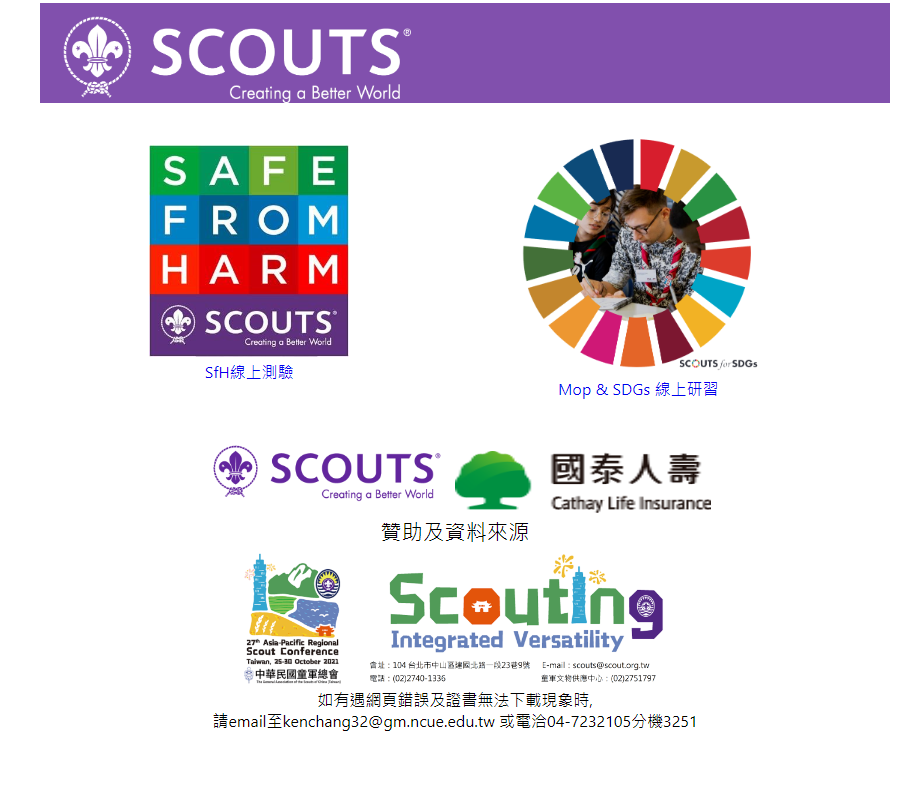
Figure 1: Online learning and testing platform for SDG and SFH courses of the General Association for the Scouts of China (Taiwan)
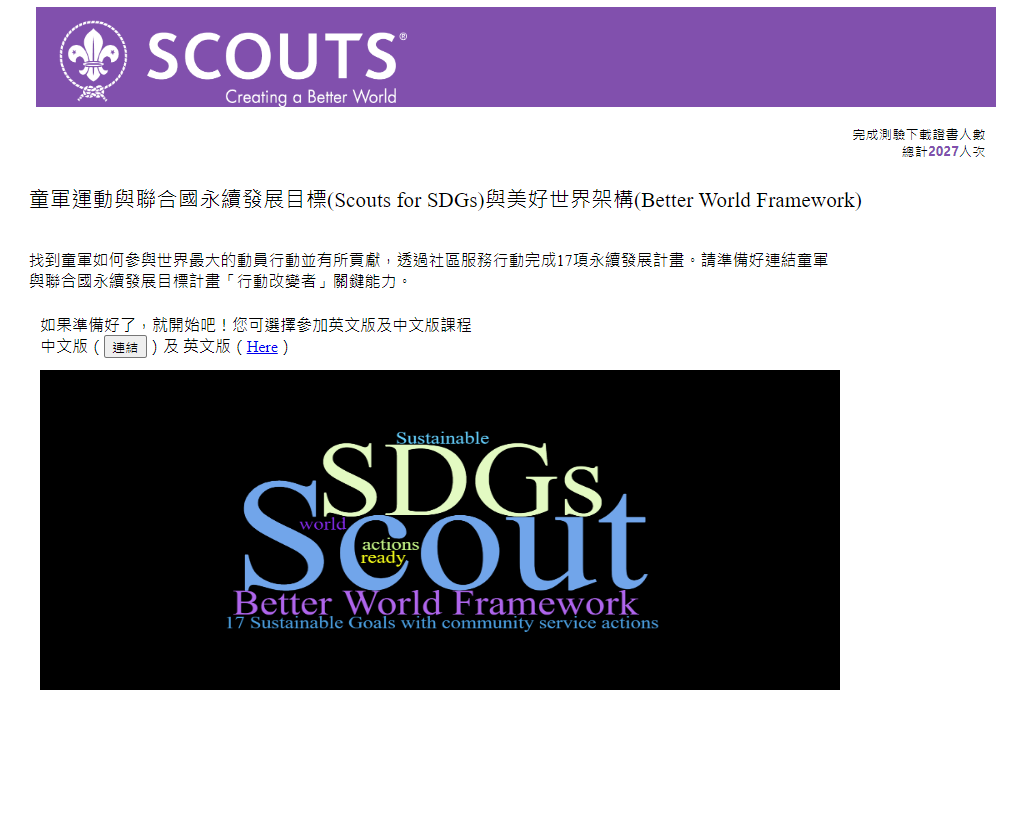
Figure 2: Scouts for SDGs and the Better World Framework (BWF)
- Professor Meichun Lydia Wen of the Graduate Institute of Science Education implemented MOE's "Science Education Counseling Program for Elementary and Secondary Schools for 2020 (Central District)."
This project aimed to help develop science inquiry curriculum and activities, conduct teacher empowerment workshops, and implement science inquiry learning camps to provide urban and rural school students with equal science learning opportunities to develop science literacy.
SDGs relevance: Quality Education, Reduced Inequalities
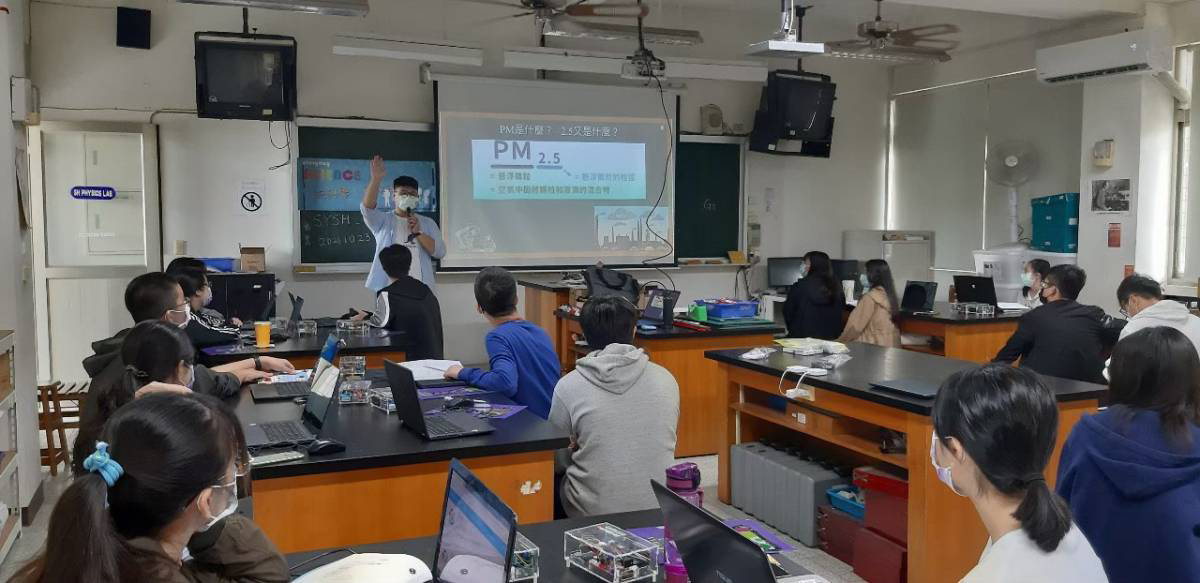
Figure 3: Science Education Counseling Program for elementary and secondary schools in 2020 (Central District)
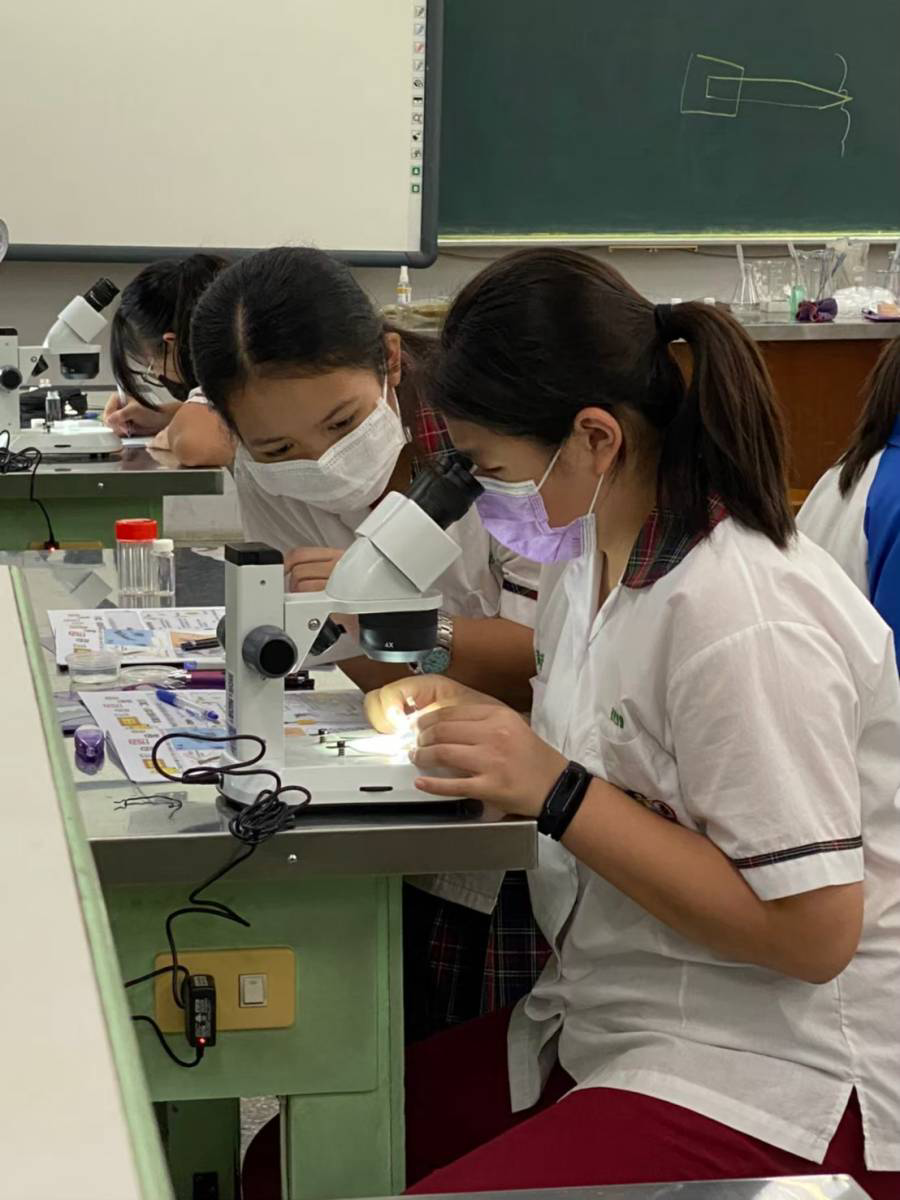
Figure 4: Science Inquiry Learning Camp
- Professor Liang-Rui Chen of the Department of Electrical Engineering implemented the "Field Research and Demonstration of Multi-Microgrid in a High Penetration PV Grid-Connected Environment" project of the Ministry of Science and Technology.
The aim was to attain national sustainable environmental policy goals through research on advanced energy storage facilities. The research includes battery storage and solar energy facilities to maximize the efficiency of electric vehicles and power grids as well as the use of blockchain technology to establish possible operating models for various business transactions and legal innovations.
Source: (Government Research Information System, GRB) https://www.grb.gov.tw/search/planDetail?id=13942735
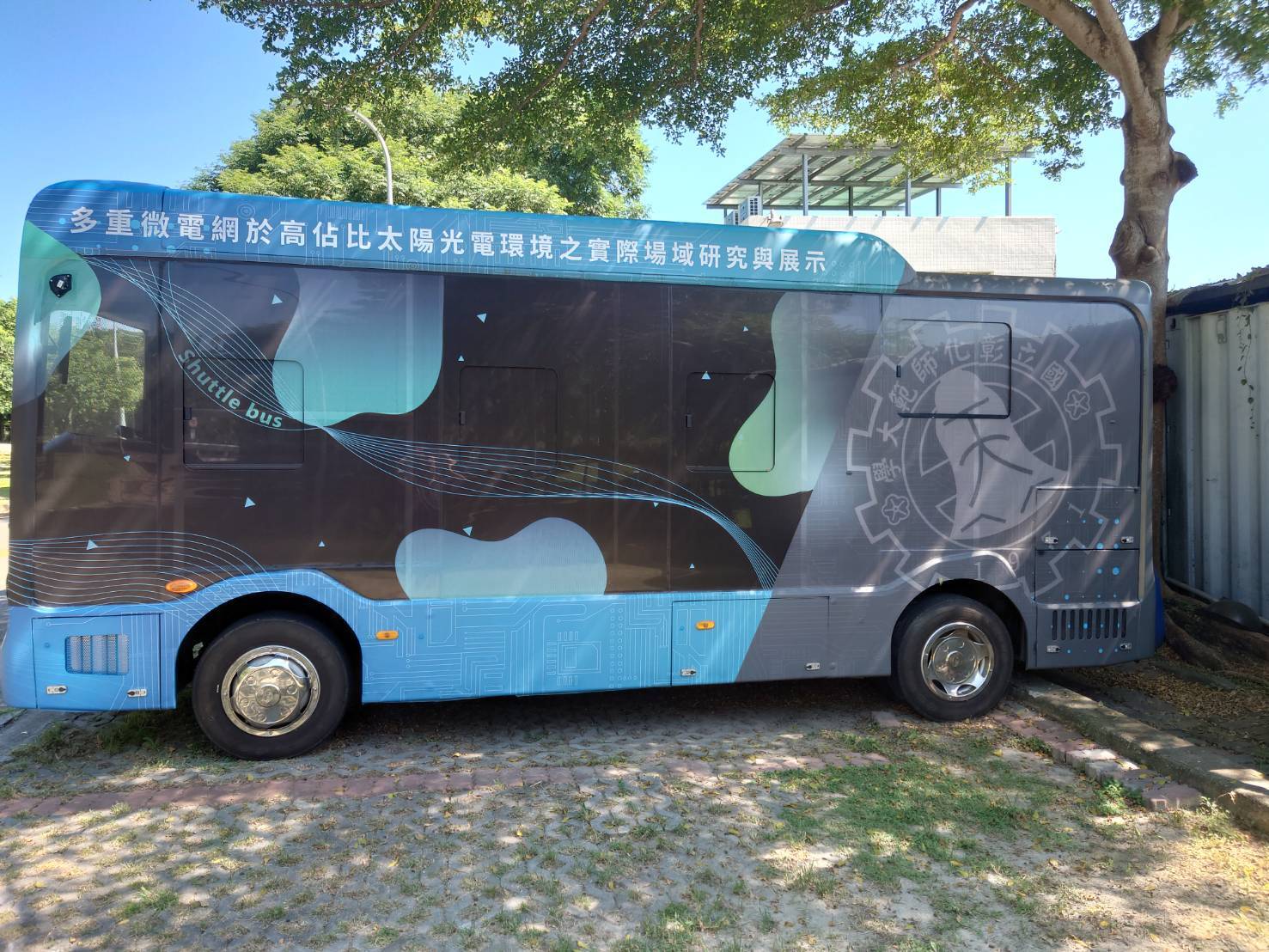
Figure 5: Study on advanced energy storage facilities using electric medium-sized buses
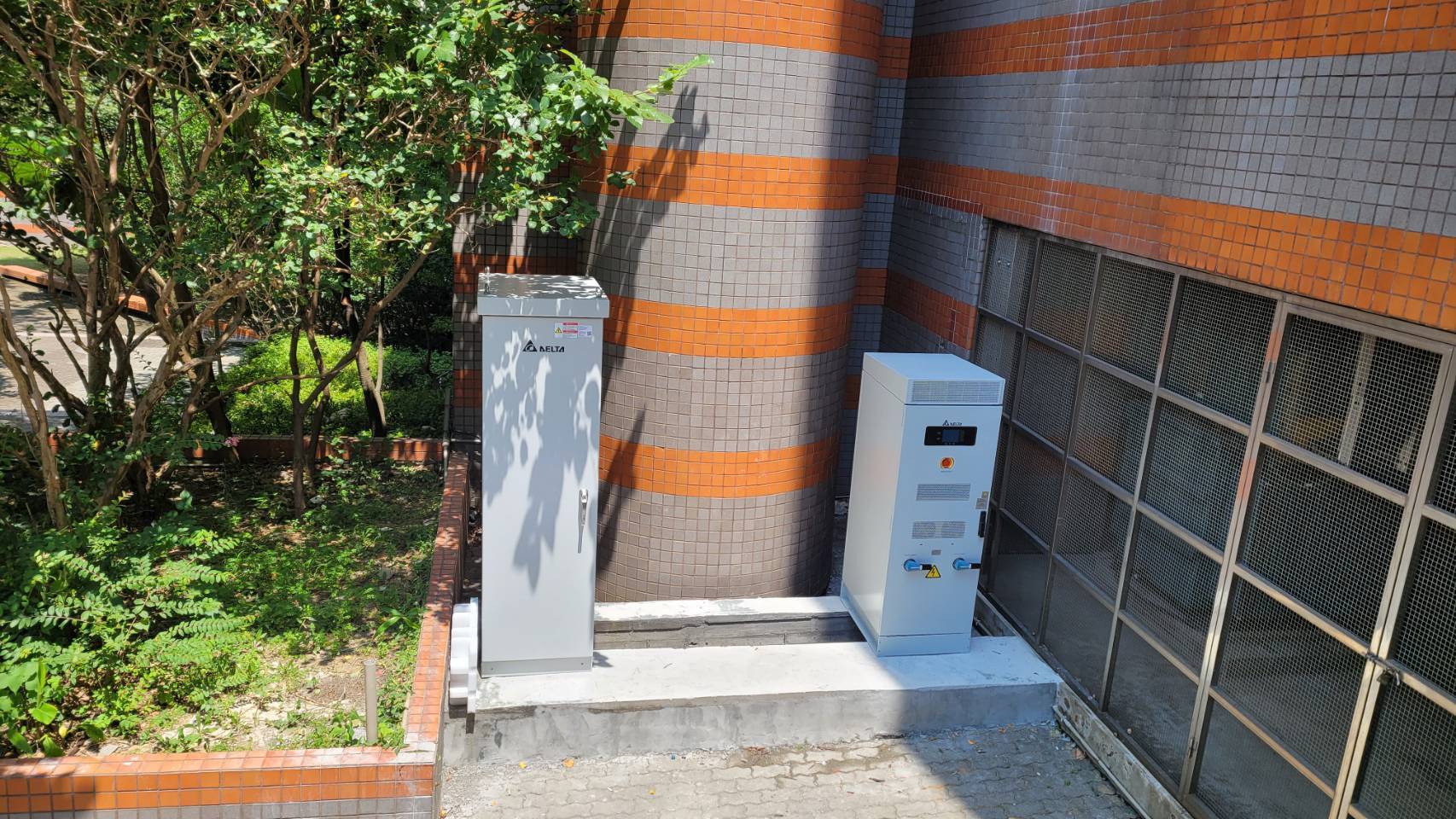
Figure 6: Setting up a battery storage system to maximize the benefits of electricity usage
SDGs relevance: Quality Education, Good Health and Well-being, Sustainable Cities and Communities, Climate Action
- Professor Chia-Jyi Liu of the Department of Physics implemented the "Research on the Development and Effects of Using Smart Chatbots in Empathy Training Courses" project of the Ministry of Science and Technology.
The study involved the use of an intelligent robot in empathy training courses. It is predicted that learners can record the user's emotional expressions, fluctuations, and voice dialogues by chatting with virtual objects (intelligent robots) to assess the user's level and ability to use empathy. Moreover, it is hoped that this could be used as relevant information on intelligent robots to facilitate future adjustments to the voice robot corpus or gradually train the smart chatbots on empathy. Please refer to Annexes 17.2.1A and 17.2.1B for the supporting information.
SDGs relevance: Good Health and Well-being
- Professor Kai-Chao Yao of the Department of Industrial Education and Technology implemented MOST's "Establishment and Evaluation of Machine Learning Module Topic in Robot Teaching Based on Thematic-Approach Strategy (2/3)" project.
This project addresses the machine learning part in AI intelligent robotics that has not yet been integrated into robotics education. A theme-based robot learning module with a focus on machine learning is planned and will be integrated into the curriculum in a theme-embedded way. It is expected that the concept of machine learning can be consolidated into robot design and practice courses so that students get to learn about more advanced AI robots. In the first year of implementation, the technical competency indices and teaching content planning required for the curriculum were completed. Moreover, machine learning technologies for sensor control and mobile control were built. In the second year, the project will further build on the achievements of the first year and continue with the technology development model as well as develop and test the theme-based robotics teaching module with image recognition machine learning as the orientation. Moreover, this project will design and plan the teaching aids and materials required for the implementation of theme-based teaching. Please refer to Annex 17.2.1C for more details.
SDGs relevance: Quality Education, Decent Work and Economic Growth, Industry, Innovation and Infrastructure
- Professor Lih-Horng Hsieh of the Department of Guidance and Counseling implemented MOE's “Establishment and Practice of a General Education Courses on Artificial Intelligence and its Applications with the Introduction of the Spirit of Inquiry and Practice" project.
The project aims to investigate the effects of the general course on "Artificial Intelligence and its Applications" on the artificial intelligence (AI) literacy of counseling and consulting students and introduce the spirit of inquiry and practice in the teaching process of the general education course "Artificial Intelligence and its Applications.” The purpose is to enable students from non-information technology and engineering-related disciplines to learn about the meaning of AI through the concept of AI in the course session and the experience of the practice course so as to enhance their AI literacy, and to investigate how AI can be applied in the field of counseling and guidance, as well as to enhance their cross-disciplinary cooperation and communication skills. The study results will serve as a basis for adjusting and revising the contents of the “AI and its Applications” course.
SDGs relevance: Quality education
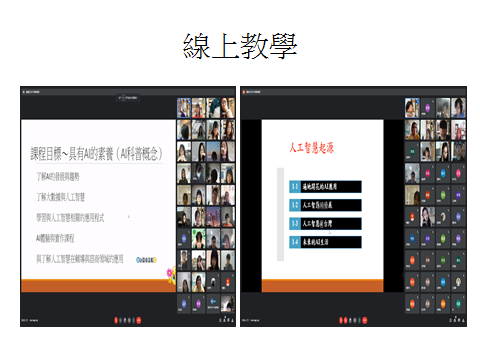
Figure 7: Online teaching
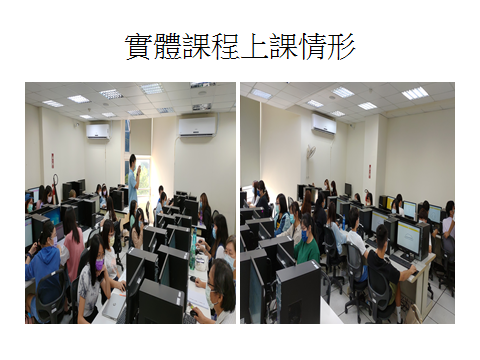
Figure 8: In-person classes
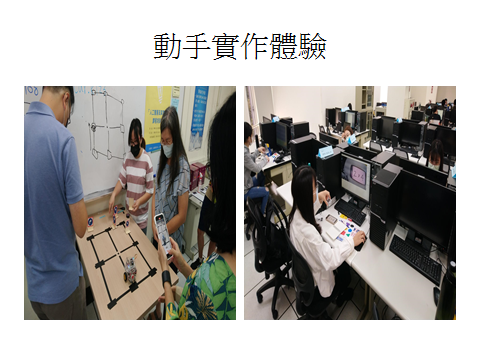
Figure 9: Practical hands-on experimentation
- Professor Chien-Huei Lin of the Department of Special Education implemented MOE's project on “Literacy-Oriented Interdisciplinary Teaching - Professional Community of Teaching Materials and Methods for Education for Students with Severe Disabilities"
The project brings together seven teachers from universities across the country whose primary field of teaching is education for students with severe disabilities as well as ten practical teachers, professional therapists, and educational administrators currently serving in general high schools or special education schools across Taiwan to conduct a two-year professional growth community in a cross-disciplinary collaborative fashion. Through regular empowerment workshops and co-planning, class observation, and discussions, all community members are able to enhance their professional knowledge in the field of severe disabilities. The ultimate goal of the community is to publish a textbook, currently titled "Teaching Materials and Methods for Students with Mental and Physical Disabilities - Special Education Classes" for special needs students across Taiwan, to be used as teaching materials and methods in courses for students with severe impairments.
SDGs relevance: Quality Education, Reduced Inequalities
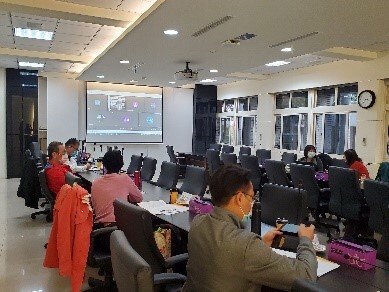
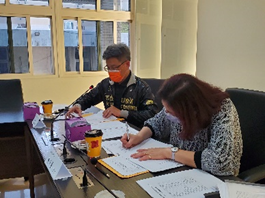
Figures 10 and 11: Community members signing a contract with Huateng Publishing to publish a book
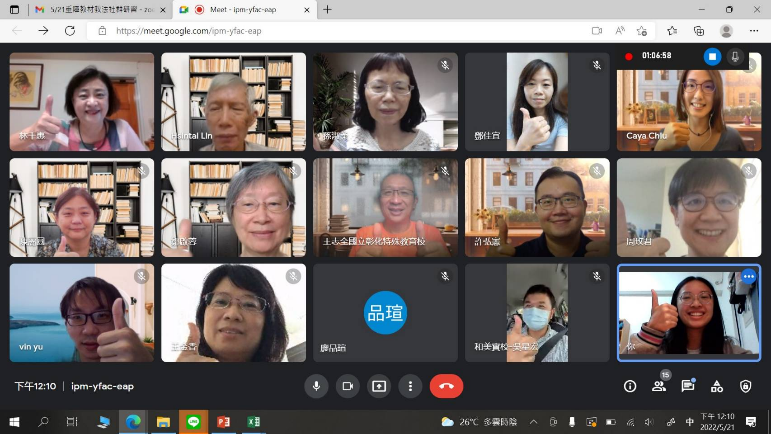
Figure 12: Screenshot of a regular online workshop for community members
- Professor Chih-Wei Peng of the Department of Accounting completed the Ministry of Science and Technology's "How Do Organizational Behavior Perspectives Affect Financial Reporting Quality of Family-Controlled Firms?" project
Family-controlled firms play a crucial role in the economic growth or industrial development of a country. However, the extant literature is rather divided on how family-controlled firms affect the quality of financial reporting. This project examines how family-controlled firms influence the quality of financial reporting from the perspective of organizational behavior. Relevant research findings can serve as a reference for the authorities to formulate industrial policies. Please refer to Annex 17.2.1D for more details.
SDGs relevance: Decent Work and Economic Growth, Responsible Consumption and Production, Peace, Justice, and Strong Institutions
- Professor Yu-Liang Tseng of the Department of Geography implemented Taoyuan District Agricultural Research and Extension Station’s “Survey and Evaluation of the Application of Urban Landscape Plants Planting Management Module" project.
This project aimed to promote energy saving, carbon reduction, and agri-food education through the establishment of the "Urban Landscape Plants Planting Management” module. Please refer to Annex 17.2.1E for more details.
Annex 17.2.1E: Professor Yu-Liang Tseng's implementation of Taoyuan District Agricultural Research and Extension Station’s “Survey and Evaluation of the Application of Urban Landscape Plants Planting Management Module" project
SDGs relevance: Good Health and Well-being, Sustainable Cities and Communities, Responsible Consumption and Production, Climate Action
- Professor Pei-Wen Lu of the Department of Geography serves as a member of the Urban Planning Committee of the Ministry of the Interior.
She assists in the review of the proposed changes to urban plans, study of the actual implementation of the existing urban plans and recommendations on the financial aspects of the implementation of urban plans, review of the existing laws and regulations, study of the acquisition and multiple-purpose use of public facility sites as well as other recommendations on urban planning.
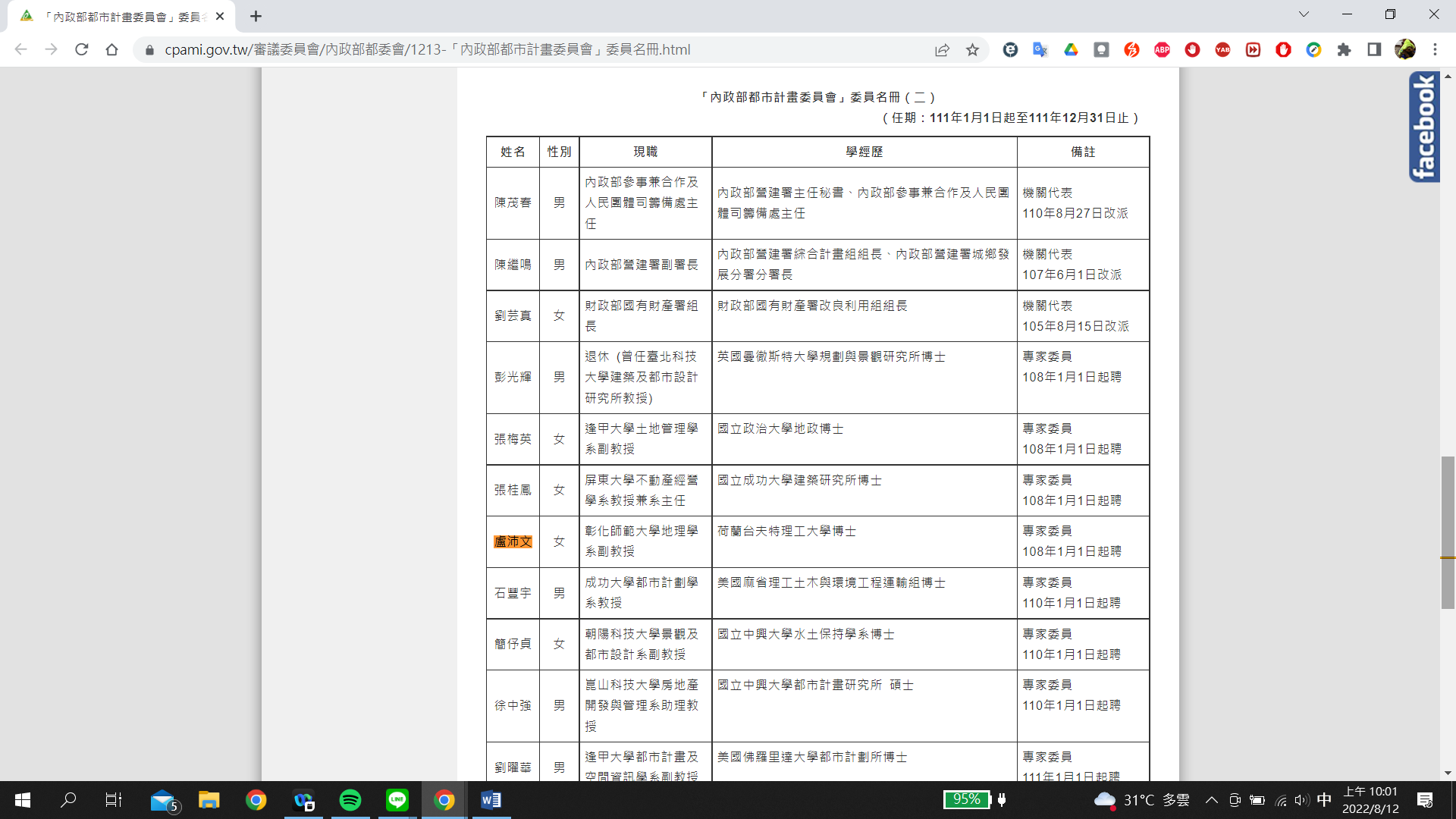
Figure 13: List of the members of the Urban Planning Committee of the Ministry of the Interior (2) (Source: List of members of the Urban Planning Committee of the Ministry of the Interior (2)
SDGs relevance: Good Health and Well-being, Decent Work and Economic Growth, Industry, Innovation and Infrastructure, Sustainable Cities and Communities
- Professor Pei-Wen Lu of the Department of Geography is a member of the National Park Planning Committee of the Ministry of the Interior.
She assists in the deliberations of the National Park Plan and on the development of water resources and minerals in special landscape areas and ecological reserves. She also conducts field surveys and research on issues related to the National Park and formulates opinions to provide references for discussion and deliberation at meetings.
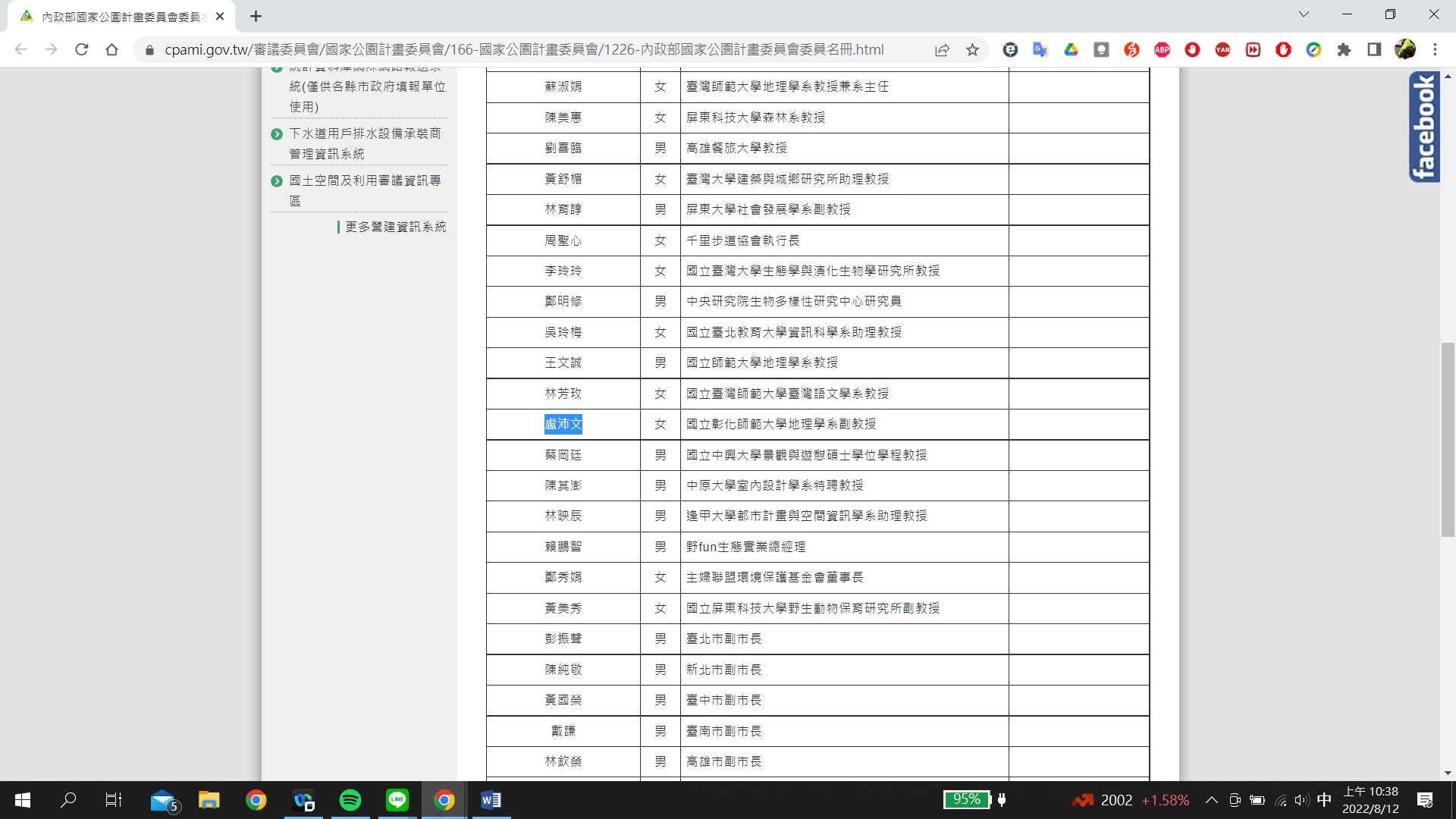
Figure 14: List of the members of the National Park Planning Committee of the Ministry of the Interior (2) (Source: National Park Planning Committee (National Park Planning Committee Member List of the Ministry of the Interior (110.3.1 to 112.2.28))
SDGs relevance: Good Health and Well-being, Decent Work and Economic Growth, Industry, Innovation and Infrastructure, Sustainable Cities and Communities
- Professor Kai-Chao Yao of the Department of Industrial Education and Technology serves as a reviewer for the Department of Applied Science Education of MOST and assists the department in promoting and reviewing research projects related to the Department of Applied Science.
SDGs relevance: Quality Education, Clean Water and Sanitation, Affordable and Clean Energy, Decent Work and Economic Growth, Industry, Innovation and Infrastructure, Sustainable Cities and Communities, Responsible Consumption and Production, Partnerships for the Goals
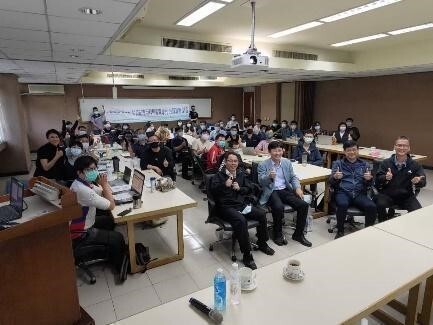
Figure 15: Meeting of the Committee of Applied Science Education, MOST
- Professor Yi-Te Liu of the Department of Sports serves as a member of the Athletes' Commission of the Chinese Taipei Table Tennis Association and participates in the discussion of the training arrangements and tournament details for national table tennis players.
SDGs relevance: Good Health and Well-being, Quality Education
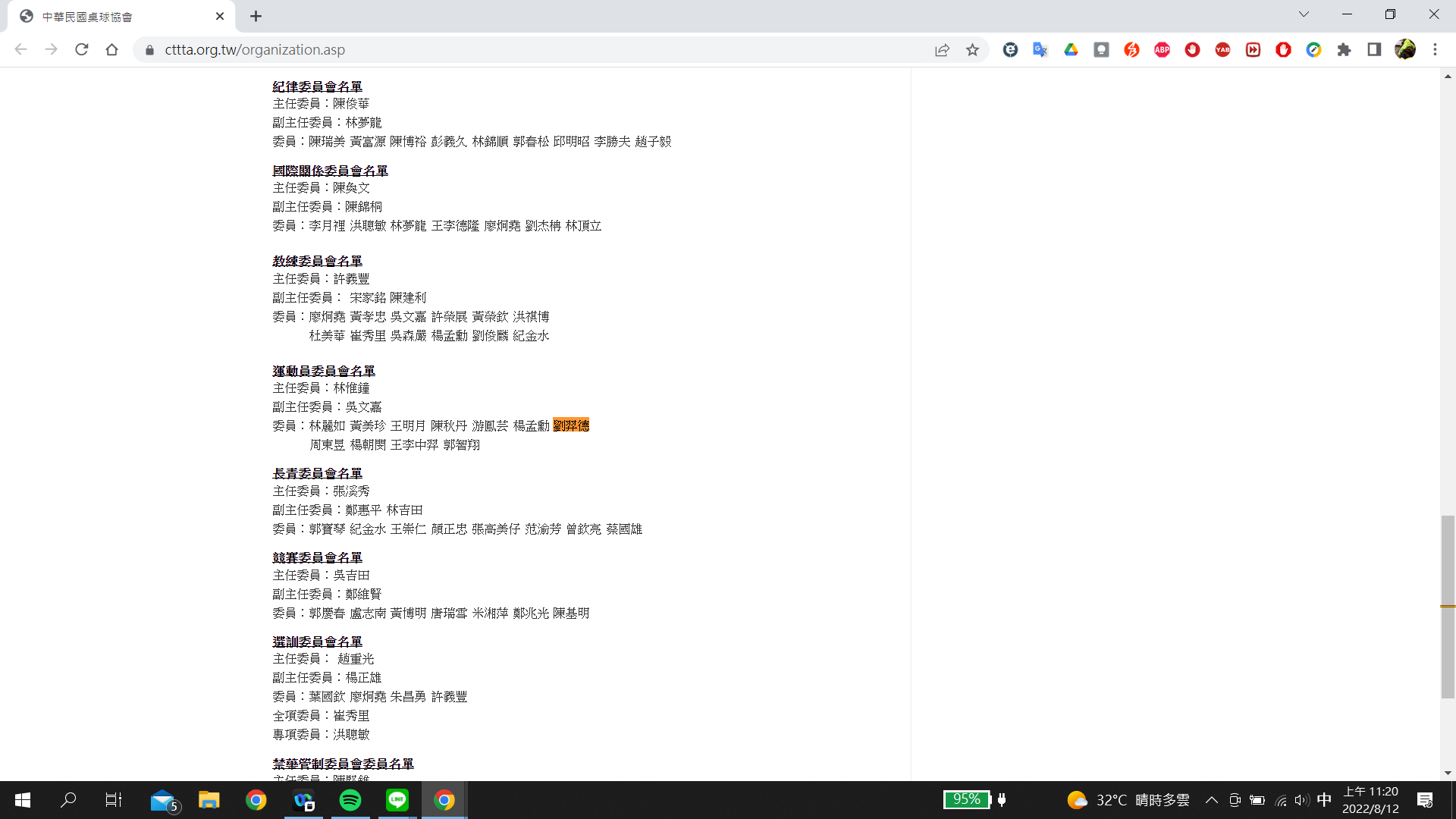
Figure 16: List of the members of the 13th Athletes' Commission of the Chinese Taipei Table Tennis Association (Source: Website of the Chinese Taipei Table Tennis Association (Source: ROC Billiard Association website https://www.cttta.org.tw/organization.asp)
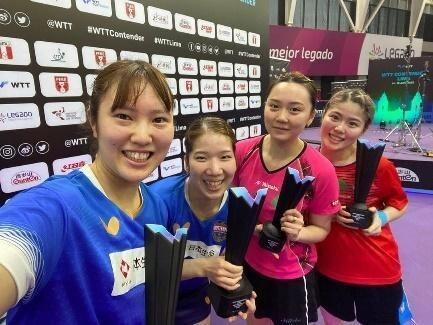
Figure 17: Table tennis players
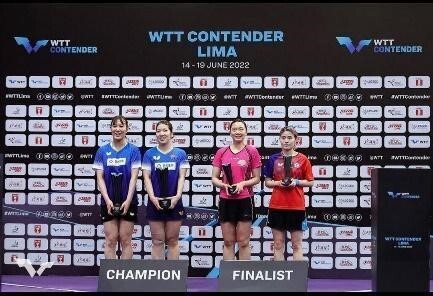
Figure 18: Table tennis players
- Professor Chin-Yen Chen of the Department of Guidance and Counseling serves as a member of the Gender Equity Education Committee and convener of the Campus Gender Incident Prevention Group of the MOE. She assists in gender equity education policy planning and incident prevention and management.
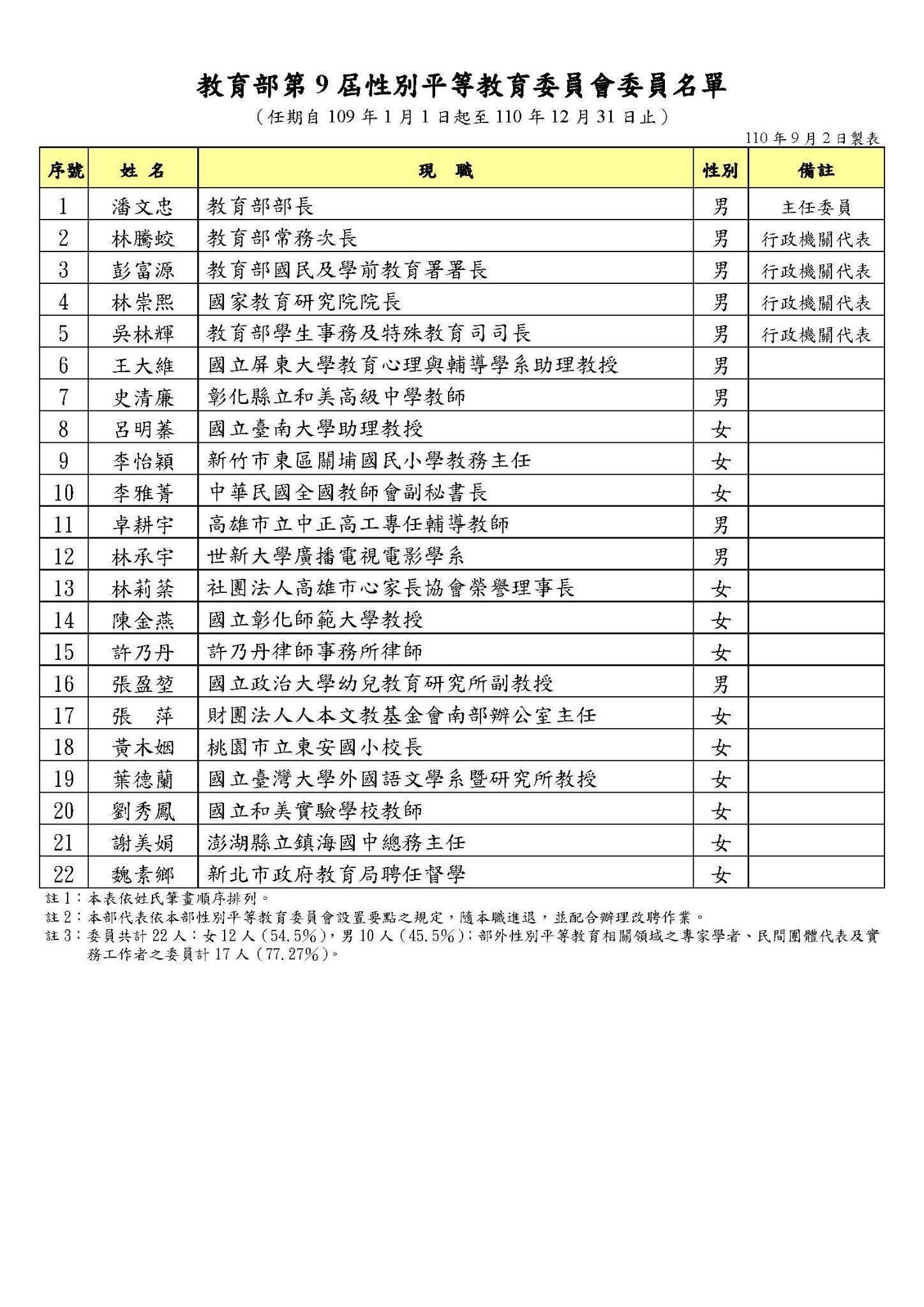
Figure 19: List of the members of the Ninth Gender Equity Education Committee (Source: Global Information Website of the Gender Equity Education Committee https://www.gender.edu.tw/web/index.php/m2/m2_02_02_index)
SDGs relevance: Quality Education, Gender Equality
- Professor Hsiao-Lin Tuan of the Institute of Science Education serves as a member of the Science Education Advisory Committee of the MOE. She assists the committee in planning the policy direction of science education, providing suggestions on such matters, as well as advice and professional consultation on the overall development of science education.
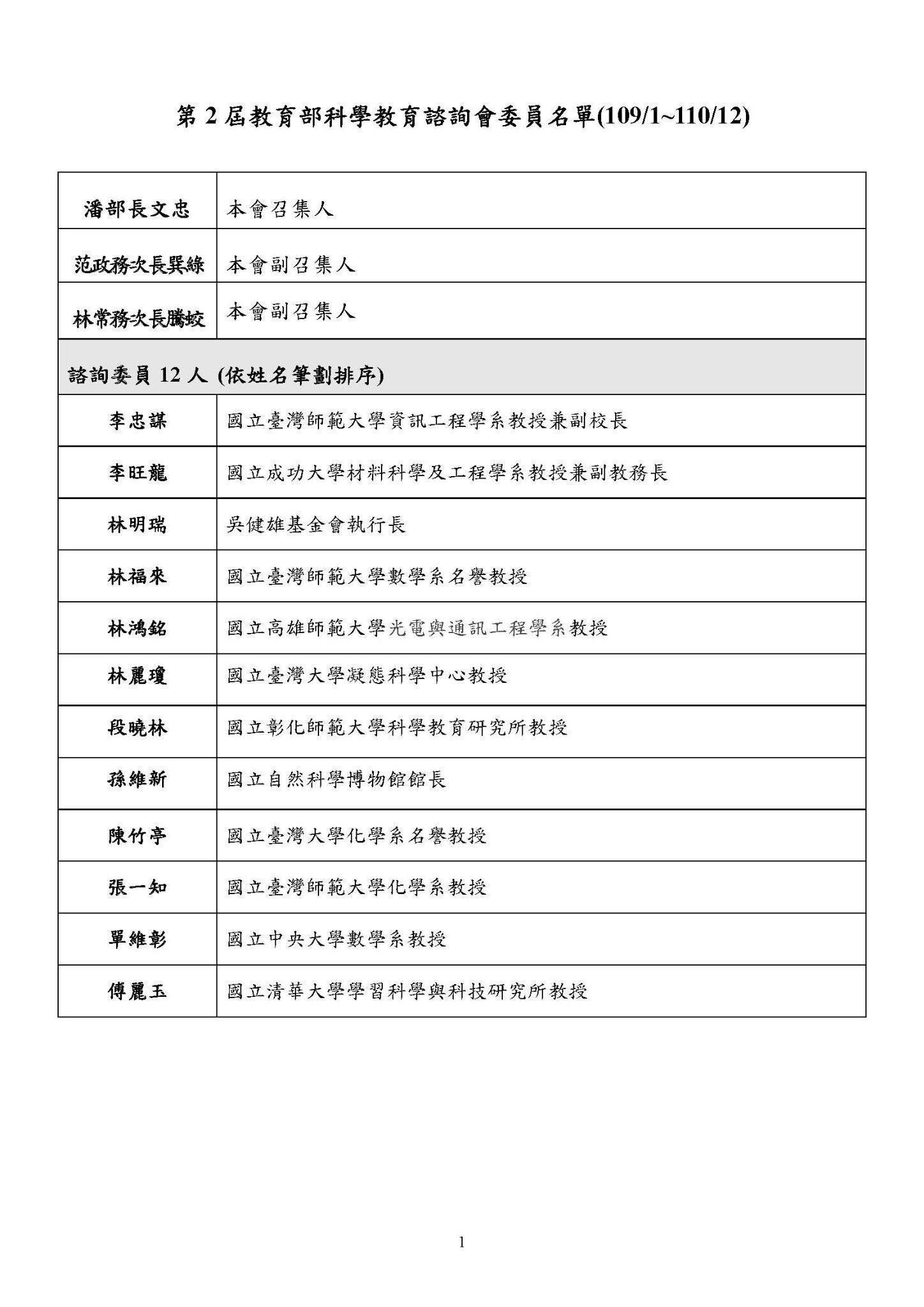
Figure 20: List of the Members of the Second Science Education Advisory Committee of the MOE (January 2020–December 2021) (Source:
website of the Department of Information and Technology Education of the MOE)
https://depart.moe.edu.tw/ED2700/News_Content.aspx?n=2C2E6CD3C89ED191&sms=7343309F6349D36E&s=4A106530377F1A59
SDGs relevance: Quality Education
- Professor Chao-lung Liu of the Department of Public Affairs and Civic Education serves as an advisory committee member in the Civil Service Development Institute, Central Office of the Executive Yuan (2016–2021), responsible for reviewing relevant plans and public policies as well as attending internal meetings to propose suggestions.
SDGs relevance: 1. No Poverty, 3. Good Health and Well-being, 4. Quality Education, 5. Gender Equality, 8. Decent Work and Economic Growth, 10. Reduced Inequalities, 11. Sustainable Cities and Communities
- Professor Chao-lung Liu of the Department of Public Affairs and Civic Education serves as a supervisor in the Taiwan Association of Local Governance Research (2020–2021), responsible for attending the meeting of supervisors as well as organizing and planning activities throughout the year.
Source: Website of Taiwan Association of Local Governance Research: https://localtw.org/about/authors/
Fan Page- ‘Pavilion Feet Local Governance’:
https://www.facebook.com/%E4%BA%AD%E4%BB%94%E8%85%B3%E3%84%9F%E5%9C%B0%E6%96%B9%E6%B2%BB%E7%90%86-797761633921958/
SDGs relevance: 3. Good Health and Well-being, 5. Gender Equality, 8. Decent Work and Economic Growth, 11. Sustainable Cities and Communities, 16. Peace, Justice, and Strong Institutions, 17. Partnerships for the Goals
- Professor Chao-lung Liu of the Department of Public Affairs and Civic Education serves as a supervisor of the Chinese Association of Local Self-governance (2010–2021), responsible for attending the meeting of supervisors as well as organizing and planning activities throughout the year.
SDGs relevance: 5. Gender Equality, 11. Sustainable Cities and Communities, 16. Peace, Justice, And Strong Institutions, 17. Partnerships for the Goals
Annexes:
- 17.2.1A-1st Round with Subtitle-2 (.MP3)
- 17.2.1B - "Research on the Development and Effects of Using Smart Chatbots in Empathy Training Courses" Project Summary
- 17.2.1C: Report (condensed) on the outcomes of the project "Development and Evaluation of Thematic Robotic Teaching Modules for Machine Learning (2/3)"
- 17.2.1D: "How Organizational Behavior Perspectives Affect the Quality of Financial Reporting in Family-Controlled Businesses" Project Summary
- 17.2.1E: "Survey and Evaluation of the Application of Urban Landscape Plants Planting Management Module" Project
Click Num:
